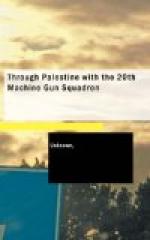The day after the Brigade arrived at Deiran they moved via Naane[6] and Annabe to between Harmash and Nalin, 14 miles north-east. Here they stayed three days, watering twice daily, at Hadithe, about 3 miles east-north-east of Ludd. About this time the weather broke and heavy rain set in. This downpour, accompanied as it was by a considerable fall in the temperature, was a severe trial for troops attired in summer clothing who, until a few hours previously, had been suffering from excessive heat!
At 09.00 on November 23rd they went through Ludd about 16 miles south-east to Zernuka. The 24th was spent there, and on the 25th they moved in the afternoon to Rishon-le-Zion (Ayun Kara), 6 miles due north, in reserve to the Anzacs, as the enemy was becoming active in this quarter. They stayed here the following day, and men were allowed to go into the town. Rishon-le-Zion is a pretty little place, and another example of the Zionist movement. Here are large wine distilleries, and very good wine they make too! Before the War large quantities were regularly sent to England.
The next morning (November 27th), the Brigade returned to Zernuka (close to Akir[7]). They arrived about midday and watered. Late in the afternoon Lieut. Oakley arrived, bringing 40 remounts and reinforcements for the Brigade (none for this Squadron unfortunately); he had ridden the 70 miles from Belah in 30 hours, and had, in fact, only left Cairo at 18.15 on the 24th.
FOOTNOTES:
[5] Ramleh was a city of
the Crusaders, and suffered in the wars
between the Franks and Saladin.
During the French invasion Napoleon
made this town his headquarters.
[6] Naane; Naamah, see Joshua xv, 41.
[7] Akir = Ekron, see Joshua
xv, 11, 45, xix, 43; I Sam. vi; III Kings
i; Jer. xxv, 20; Amos i, 8;
Zeph. ii, 4; Zech. iv, 5.
THE BEIT UR ET TAHTA OPERATIONS.
The British line had been advanced and now extended from the River Auja north of Jaffa on the coast, south-east to a few miles north-east of Jerusalem and thence due south. The Turk at this time, although greatly demoralised, was making some desperate counter-attacks.
At 17.00 on November 27th, orders were received for a move that night at 21.00. The Brigade was required, in a great hurry, to fill a gap in the line that the Turks had discovered, and of which they appeared to intend to take advantage.
Of the Machine-Gun Squadron, only Headquarters and three sub-sections ("A” “D” and “E”) were to go, but were made up to working strength by men from “B” and “C” Sub-sections. The Officer Commanding, Capt. Marshall, was there, and the “second in command,” Capt. Davies. Lieut. Price, M.C., still commanded “E,” but Lieut. Cazalet being sick, Lieut. Hibbert took his place in command of “A”. “D” Sub-section was under Sergt. Fleet, who had just been notified that he had been awarded the Military Medal for his splendid work at Hudeiwe and elsewhere.




